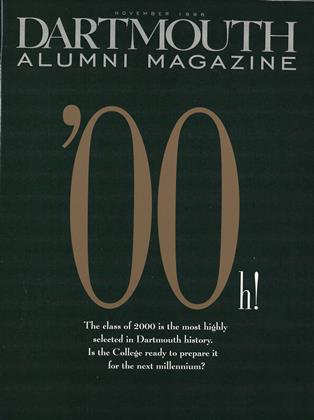The Longest War We Lost and Recalling a Small Boat in tie Big One
It's the longest war in American history, and Ait has been lost. That is the thesis of DrugWar Politics: The Price of Denial, a new book by Swarthmore College political scientist Ken Sharpe '66 and three co-authors. The assumption that drug users are morally weak and that drug use is criminal behavior has prevented Americans from seeing drug abuse for what it truly is—a serious public health problem, say the authors. In the process the "War on Drugs" has become one of the sacred cows of American politics, trapping Congress and successive administrations into out-toughing each other to avoid seeming "soft on crime."
Drug War Politics does not argue for legalization. Rather, Sharpe and his colleagues propose a "public-health paradigm" under which the government would abandon its unrer alistic zero-tolerance policy and shift resources to education, prevention, and treatment. The aim would not be more punishment but better health, and the measure of success would no longer be tons seized but lives saved.
DickKeresey '38 commanded a PTboat in a squadron that included Kennedy's famous 109. In PT 105 Keresey's memory is sharp for dramatic incidents, and his sense of humor belies the life-or-death situations that he and his crew and his fellow captains faced nightly. He was once assigned as a decoy to lure out of base a squadron ofjapanese Zeros that regularly preyed on the PT boats. The plan was to test the capability of a newly designed American fighter plane. The new plane never showed up; the Zeros did.
 View Full Issue
View Full Issue
More From This Issue
-
 Feature
FeatureCue the Millennium
November 1996 -
 Feature
FeatureA Billion Dollars
November 1996 By Rebecca Bailey -
 Feature
FeatureThe Inside Story
November 1996 By Karl Furstenberg -
 Cover Story
Cover StoryOught Ought
November 1996 By Joe Mehling '69 -
 Article
ArticleWhat Beethoven Heard
November 1996 By Kathleen Burge '89 -
 Article
ArticleA Two-for-One- Convocation and the Med School's 200th
November 1996 By E. Wheelock
Article
-
 Article
ArticleDartmouth Defeats Tech in Track
June, 1911 -
 Article
ArticleFirst Dartmouth Governor of New Hampshire in more than thirty years John H.
December 1918 -
 Article
ArticleRenaissance Conference
April 1949 -
 Article
ArticleThey Threw Back 14-Pounders
November 1950 -
 Article
ArticleTop Glass Secretary
June 1955 -
 Article
ArticleThayer School
November 1949 By William P. Kimball '29

